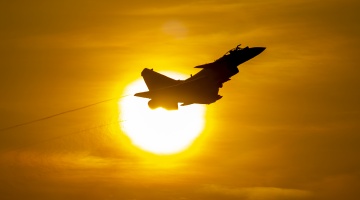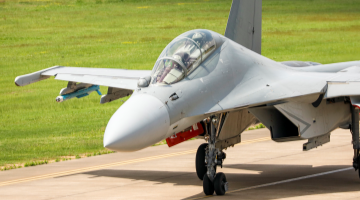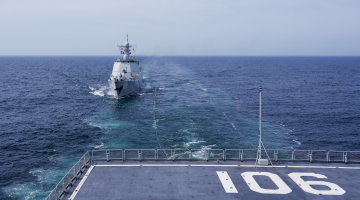By Song Bo
Japanese media quoted data released by the Japanese Ministry of Defense earlier this year as showing that from April to December 2022, the Japanese Self-Defense Force (JSDF) carried out a total of 612 fighter scrambles, with takeoff frequencies and costs ever increasing. Recently, it was reported that the JSDF is considering sending drones to intercept foreign aircraft approaching its airspace instead of manned jets.
Shao Yongling, a military observer, believes that Japan has set up oversized air defense identification zones (ADIZs) under the banner of "security anxiety", but its existing air defense capabilities are unable to address its so-called airspace security issues. The mainstay fighter jet of the Japan Air Self-Defense Force (JASDF) is the F-15, with an estimated only about 100 currently. However, Japan has designated wide-ranging ADIZs, which have expanded the scope of its patrols. This makes both Japanese aircraft and pilots struggling to cope with a state of frequent takeoff and landing.
Regarding Japan's idea of using drones to intercept foreign warplanes, Shao Yongling believes that there is a significant gap between drones and manned warplanes in terms of speed, altitude, and carrying weapons. In terms of the current level of technology, it is not possible for drones to effectively intercept manned warplanes. On the one hand, the top speed of a drone is four or five hundred kilometers per hour, but the speed of the fighter jet is generally above Mach 1. On the other hand, the practical flight height of drones cannot be too high, such as the offensive strike UAV MQ-9 Reaper, which has a ceiling of about 15,000 meters, but the practical flight height of fighter jets is above 20,000 meters. Finally, coupled with the fact that drones carry very few weapons, mainstay drones at present are incapable of intercepting fighter jets, and may only be used for surveillance.
Recently, an American MQ-9 Reaper drone crashed in the Black Sea. The US and Russia have traded accusations and blamed each other for the cause of the crash. Given this incident, Shao Yongling believes that Japan's idea of intercepting foreign warplanes with drones may have ulterior motives.
Compared to manned fighters, drones feature relatively small in size and have relatively few restrictions in use. Furthermore, they even have the opportunity to enter or even penetrate the airspace of other countries. In addition, there are many reasons to justify the "cross-border" behavior of drones. After all, drones rely on the remote control or autonomous flight. Regarding the US drone's crash in the Black Sea, it is easy for us to imagine that if there is any chance for the US to send a manned warplane to a place so close to Russia.
Therefore, drones do bring some new tactical applications. Compared to manned fighters, you can be more daring in applying drones. Even if there are some "cross-border" behaviors, it is difficult to clearly distinguish the liabilities. Therefore, we cannot but help say that Japan's application of drones to intercept foreign warplanes must have ulterior motives.
Editor's note: Originally published on military.cnr.cn, this article is translated from Chinese into English and edited by the China Military Online. The information and opinions in this article do not necessarily reflect the views of eng.chinamil.com.cn.









